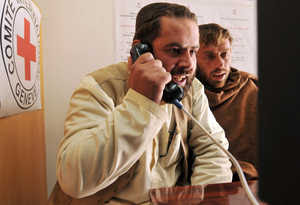
GUANTANAMO BAY NAVY BASE, Cuba — ET, the extra terrestrial, tried to do it. Now the Pentagon has decided to let ECs, or enemy combatants, do it too — phone home.
Army Lt. Col. Edward M. Bush said Tuesday that the Department of Defense has approved a policy to let at least some of the 275 or so war-on-terror detainees here speak by telephone with family.
How? They’re working on it.
”I have no projected timeline for implementation but it is currently being developed,” said Bush, a detention center spokesman.
Approval of the idea comes two months after the International Committee of the Red Cross launched a pilot program in Kabul, Afghanistan, that lets Afghan families to speak by a teleconference video with select U.S.-held captives in the Bagram Air Base, a U.S.-run lockup.
No such single site could be set up to speak with detainees held as ”enemy combatants” here. Their families are spread across far-flung nations from Canada and China to Sudan and Yemen.
On paper, the policy would permit at least certain detainees twice-a-year phone calls.
”Obviously, anything that mitigates the crushing isolation these men have experienced for more than six years is welcome news,” said Illinois law school professor Marc Falkoff, who has for years handled unlawful detention suits on behalf of about a dozen Yemeni detainees.
But he was skeptical about the initial announcement. He suggested it might be a publicity stunt ahead of a coming U.S. Supreme Court decision on detainee rights meant to portray the prison camps in a better light.
”One phone call twice a year hardly makes Gitmo the model of a humane prison,” Falkoff said. “One of my clients has a 6-year-old daughter who he’s never seen or spoken to. She was born while he was in Guantánamo. To be honest, I don’t know whether speaking with her will lift him from his depression or simply shatter him.”
Red Cross delegates have for years had access to detainees at this remote U.S. Navy base in southeast Cuba and acted as couriers for letters between the captives and their families. First, detainees must submit their letters to U.S. military censors, who have blackened out such details as allegations of their treatment and descriptions of the sprawling prison camp complex on the Caribbean.
Past prison camps commanders have said that both logistics and security concerns would complicate telephone calls; they would require foreign language interpreters listening in to make sure detainees don’t divulge sensitive information.
U.S. commanders here have already permitted a limited number of so-called “humanitarian phone calls.”
In one case, the U.S. military approved a Guantánamo-Algeria call for a detainee to speak with his mother after learning that his father, an Algiers attorney, had suddenly died of a heart attack.
Under that scheme, the mother was asked to go to the U.S. Embassy in Algiers for the call.
There was no immediate word on whether alleged 9/11 architect Khalid Sheik Mohammed — on the short list for a death penalty prosecution — would qualify for a phone call.
He has yet to see a lawyer and is held among 15 so-called high-value detainees in segregation at a site called Camp 7, run by a special unit called Task Force Platinum
Wednesday, March 12, 2008
Combatants may get phone link to home
Posted by
rich board
at
6:14 AM
![]()
Labels: "GWOT", broken government, guantanamo bay, republican corruption, torture, war crimes, water-boarding
Subscribe to:
Post Comments (Atom)





No comments:
Post a Comment